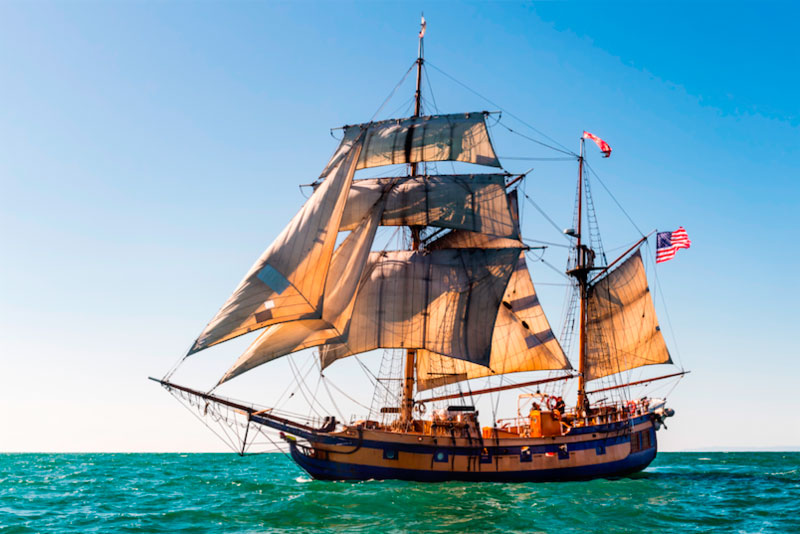The Sea School Northwest program, launching July, will provide vocational training for adults 18 to 35 aboard a tall ship
Creaking masts, canvas sails, and a wooden figurehead scanning the horizon. Not what you might think of when you picture the training platform for a modern maritime career, but a new program, Sea School Northwest, sees it differently.
“We saw an opportunity with our vessels [tall ships Hawaiian Chieftain and Lady Washington] because so many of our mariners were successfully making the switch to cruise ships, tugboats, and other types of vessels where you make a good, family wage,” says Program Director, Capt. Hali Boyd.
“Starting your training on a traditional vessel like tall ship Hawaiian Chieftain, you learn the fundamentals of being a good deckhand out in the elements. You learn knots and line handling, how to stand watch, teamwork, and awareness of your surroundings. All of these core skills prepare you go in and be effective on a modern vessel. This is why the US Coast Guard still sends their cadets to learn on the 295′ flagship Barque Eagle.”
The program is the brainchild of Grays Harbor Historical Seaport, a nonprofit located in Aberdeen, Washington. Slated to launch in July, Sea School Northwest will provide 8-week training sessions year-round, during which trainees (referred to as “cadets”) will live aboard the training ship Hawaiian Chieftain seven days a week.


Photo courtesy of Grays Harbor Historical Seaport
The program was in part sparked in response to the national lack of workers for the high-paying trades, at a time when 4-year degrees are resulting in skyrocketing student loan debt without any guarantee of employment. The average salary for maritime workers in Washington state is $70,800.
The program website also cites the need for younger workers and more diversity in the current Washington state maritime workforce, in which the median age is 54 years old, and a large gender gap exists. To facilitate access, the program is offering over 35 scholarships per year to aspiring sailors, with a specific invitation for women, people of color, LGBTQ people, registered tribal members and coastal residents to apply.
What does all of this look like in action? According to the website, cadets participate in the day-to-day running of the vessel to learn hands-on skills, and complete weekly lessons in a digital classroom with a group discussion afterward. Meals, a bunk, computer access, and essential gear are provided, as is ongoing career counseling.
“We designed this curriculum to work for a lot of learning styles” says Executive Director Brandi Bednarik. “There is hands-on, there are video lessons, articles from industry publications, visiting professionals who will talk about their job in the maritime industry. Our goal is that when a hiring manager at a maritime company sees ‘Sea School Northwest’ on a resume, they know that person has gotten a solid foundation of practical training, and is ready to work hard for them.”
If successfully completed, Sea School Northwest cadets leave with more than work experience. Weekly assignments during the program help them submit their application to the US Coast Guard for an “Ordinary Seaman” rating and Merchant Mariner Credential, like a driver’s license for professional sailors. A group of “mentor mariners,” as SSNW has dubbed them, provide ongoing career guidance and a sounding board as alumni advance.
“We don’t have formal placement partnerships starting out,” says Board President David Douglass. “What we are starting with is the 30-year reputation of Grays Harbor Historical Seaport for conditioning people for sea, and all of the relationships that comes with. I feel confident our cadets will be successful finding the right job. So many of our people have already gone that route without all of the support Sea School Northwest will be providing.”
Backed by three years of funding from the Bellevue-based Magic Cabinet Foundation and Washington Sea Grant, the program is certain to continue through 2021, and organizers are working to make it permanent. The program is currently accepting applications from people who want to participate. Full details and an application can be found at www.seaschoolnw.org.
– Sea School Northwest








